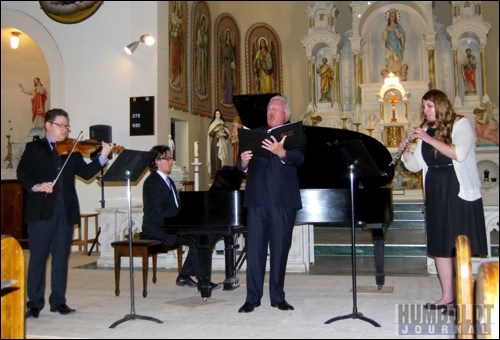So much musical talent has graced the stage of the Assumption Church in Marysburg over the years.
Last week, it was Canadian tenor Robert MacLaren and three young musicians who performed at the Marysburg Summer Festival of the Arts' first concert, May 23.
Lyricist MacLaren is already well known to Marysburg audiences. For this concert, he chose a repertory that spanned several centuries, beginning with Bach and going right through to 20th century English art songs.
MacLaren began the program with a selection of these art songs by composers Clive Carey, Roger Quilter and Ralph Vaughan Williams. While these songs made a nice introduction to the evening, MacLaren's true comfort zone - and where the audience gets to hear his immense talent - is when he sings the lieder, operetta and opera arias that he perfected when he lived for 17 years in Germany, performing as an opera soloist, recitalist and oratorio singer.
The three other musicians MacLaren reunited for this concert were pianist Chris Kayler, violinist Jeremy Buzash and oboist Laura Schroeder. It is rare to hear the oboe in a program with only a few musicians, especially one that focuses mainly on vocal interpretation. MacLaren told the audience how he discovered her talent (Schroeder plays in one of the ensemble classes that MacLaren teaches at the Marcel A. Desautels Faculty of Music in Manitoba).
"Laura is currently in her first year of the undergraduate program in the faculty of music," MacLaren told the audience, "but I was so impressed by the maturity and the quality of her playing that I wanted to include her in this program."
Schroeder played in two pieces by J.S. Bach in the first half of the program, the "Concerto for violin and oboe, BWV 1060R" and an excerpt from Bach's cantata No. 166, "Ich will an Himmel denken." It was undeniably a treat to hear that instrument in these two pieces, for there are few composers other than Bach who have written such expressive music for the oboe. It's like a signature sound in his music, where the plaintive, almost haunting quality of the oboe is given such a starring role.
Buzash exercised great precision on the violin in the Bach concerto, playing in duo with the oboe. The two instruments echoed each other's phrases, weaving in and out of modulations in minor augmentation, one never outperforming the other.
It was in the second half of the program that Buzash was able to showcase his talent as a solo performer when he played the "Hungarian Dance No. 17" by Brahms, and in "Meditation," an excerpt from the opera Thaïs by 19th century French composer Jules Massenet.
While MacLaren, Schroeder and Buzash were in the limelight on stage, one young musician had perhaps the hardest job of all that evening. As piano accompanist, Kayler had to measure the sensitivity and timing of the music throughout every piece in the concert. He never exceeded his place in the music, although he had just as important a role.His one opportunity to show that he, too, is an artist unto his own, came in the second half of the program as a soloist with Argentinian composer Alberto Ginastera's "Danzas Argentinas, op.2."
"Ginastera was only 18 years old when he composed these dances," explained Kayler. "They are not folk dances, but original compositions made to sound like they were."
In those three pieces, the first and third (Dance of the old cowherd and Dance of the skillful cowboy) were very lively and full of detail. The second piece, slow and langorous, contrasted sharply. With its sultry beat, "Dance of the lovely young girl," evoked images of Argentinian men and women gliding across a dimly-lit dance floor as they tango.
The final piece in the program was the one the audience was anticipating from the get-go. MacLaren's moving rendition of the aria "Nessun dorma" from Puccini's opera "Turandot" brought the musical voyage to an end.
It was a Marysburg event where once again, the size of the audience did not reflect the great musical talent of the performers. But the organizing committee for the Marysburg Centre of the Arts is at a loss to know how to get people interested in their concerts.
Perhaps only those who ventured out on a rainy, damp evening in May knew from past experience that a program of such musical sensitivity was in store for them.




